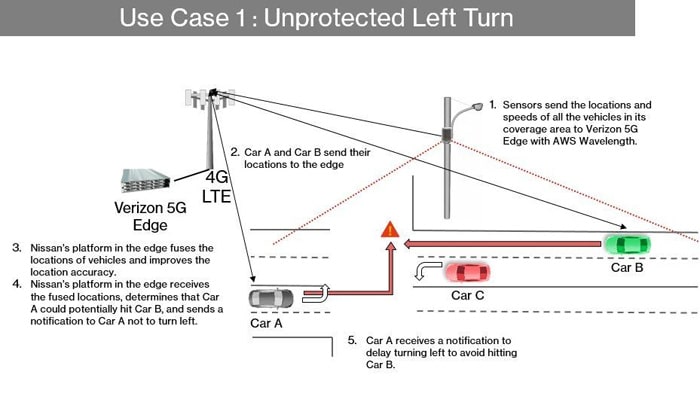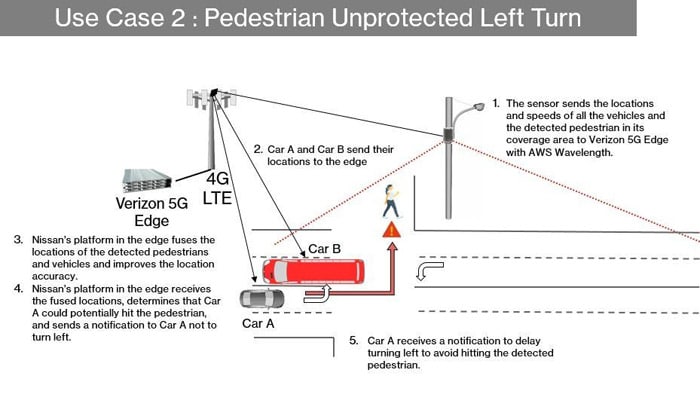Verizon and Nissan North America’s Research and Advanced Engineering team have finished a proof-of-concept demonstrating how sensor data from vehicles and surrounding infrastructure can be processed at the edge of Verizon’s wireless network and communicated back to those vehicles for safety-critical driver notifications in near real-time.
“Communication between vehicles and the environment around them, or C-V2X, will be one of the most important transportation innovations of the connected and autonomous future of driving,” explained TJ Fox, Senior Vice President of Industrial IoT and Automotive, Verizon Business.
Proof-of-Concept Testing
According to a press release from both companies, the recent test proved to be a successful application of cellular vehicle-to-everything communication (C-V2X). The trials focused on testing a variety of vehicle and infrastructure-based sensor configurations to create a multi-viewpoint picture of potential safety hazards beyond a vehicle or driver’s line of sight. The trial test was conducted by Nissan’s Silicon Valley-based Research and Advanced Engineering team.
“This proof of concept shows that edge computing with Verizon’s cellular network can help take the resource-intensive compute burden off vehicles and public infrastructure – housing their software platforms and crunching their sensor data for them,” Fox continued. “And can communicate data outward to prompt potentially lifesaving safety alerts or autonomous-driving features in the car, all essentially in real-time.”
CCTA Grant Program
As described in the press release, the Contra Costa Transportation Authority (CCTA) will initiate validation of the technology for its Automated Driving Systems Grant Program, which includes controlled deployment in select public locations in Contra Costa County, California. Contra Costa County consists of the northern portion of the East Bay region of the San Francisco Bay Area. The primarily suburban area is part of the San Francisco–Oakland–Berkeley Metropolitan Statistical Area. The CCTA program aims to accelerate mobility programs for underserved communities.
“CCTA is excited to be collaborating with Verizon and Nissan to test technology that addresses real transportation needs – delivering mobility choices to transportation-challenged and underserved communities – while preparing our county for the future of mobility,” said Timothy Haile, Executive Director for the Contra Costa Transportation Authority.
Applications & Deployment
According to CCTA, if the validation program is successful, the Verizon and Nissan technology may be implemented around busy intersections, retirement communities, or as part of the county’s Innovate 680 Program. “Taking a proactive approach to safety is a priority for CCTA, and the technology we’re testing together will contribute toward making connected and automated vehicles a safe option for future travel,” Haile said.
“Making breakthroughs in products and technologies is a core piece of Nissan’s business,” added Maarten Sierhuis, Ph.D., vice president, Nissan Technical Center North America. “The successful development and pilot of this research technology reinforces our commitment to helping keep drivers and passengers safe and the future of mobility.”
More C-V2X Stories
Similar to the announcement here, AutoVision News was able to see Vehicle-to-Everything technology from HARMAN in 2020. Audi has also made the news in recent times in Virginia with regard to C-V2X technology.





